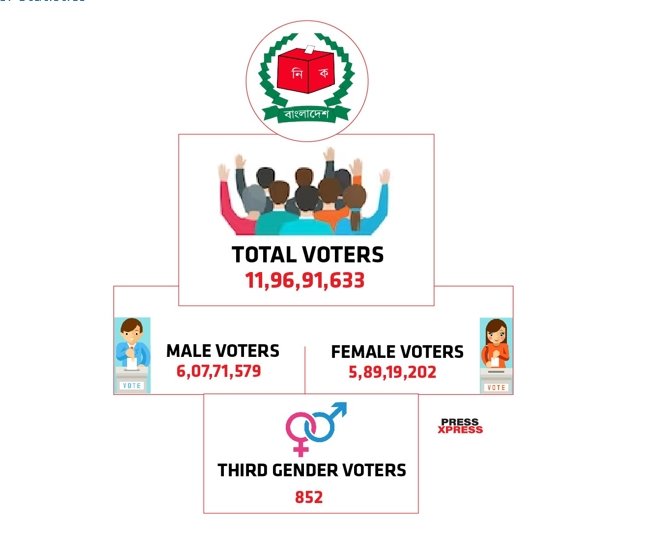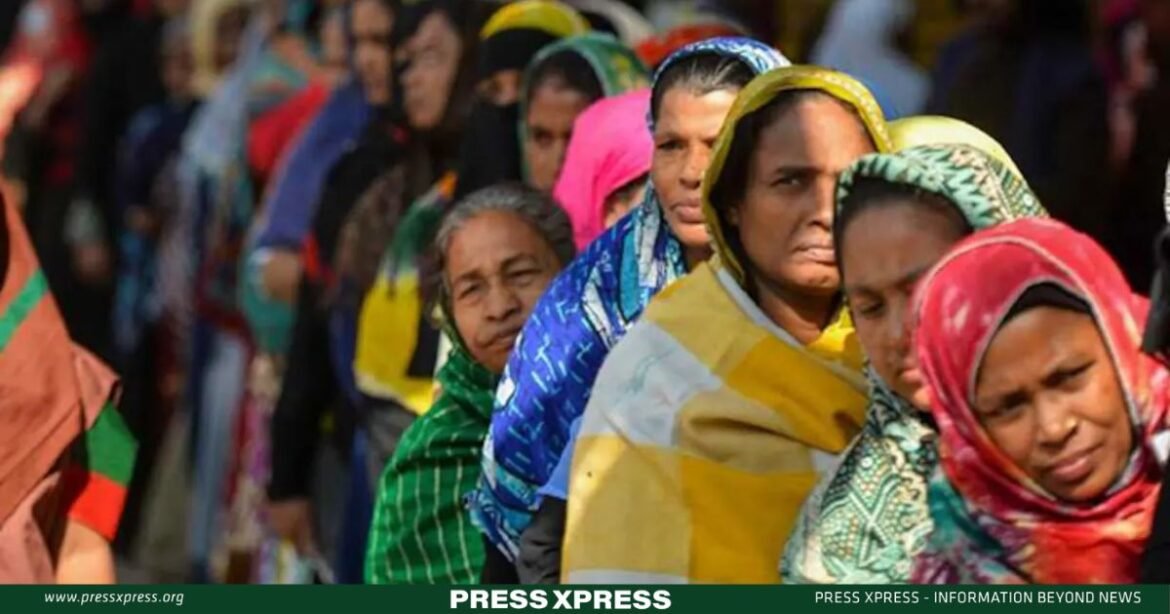Voting in the upcoming 12th National Assembly election is scheduled for next Sunday, January 7th. In preparation for the election day, the Ministry of Public Administration has issued a notification to close all government, semi-government, autonomous, and private offices and institutions across the country. As a result, Friday, Saturday, and Sunday have been designated as three consecutive days off. Ordinary voters are taking advantage of this extended weekend to leave the capital and are going to cast their votes for their preferred candidates.
You can also read: Campaign Closes, Nation Awaits Vote
Throughout Bangladesh, a festive atmosphere prevails, accompanied by comprehensive security measures to ensure the safety of everyone on election day. With a collective break from their usual busy schedules, people have begun departing from Dhaka to actively participate in the election and exercise their right to vote.
Election Overview
The official campaign for the 12th National Assembly election has concluded. Polling in 299 parliamentary constituencies is scheduled for January 7, with a one-day break. The Election Commission postponed the election for the Naogaon-2 seat due to the death of an independent candidate.
The 12th electoral event in Bangladesh encompasses the election for the President of Bangladesh, by-elections to the Jatiya Sangshad, as well as elections for five city corporations, various municipalities, and local bodies.
| Election Schedule | ||
| 15 November 2023 | Declaration of the schedule | |
| 30 November 2023 | Application date for electoral candidates | |
| 1–4 December 2023 | Scrunity | |
| 17 December 2023 | Last day of candidacy withdrawal | |
| 18 December 2023 | Symbol allocation | |
| 18 December 2023–5 January 2024 | Campaigning period | |
| 7 January 2024 | Election and results | |
Number of Candidates

Political Parties and Candidates
The Awami League has 266 candidates, the Jatiya Party has 265, and other parties also have varying numbers of candidates.
Some of the parties include Trinamool BNP, National People’s Party, Bangladesh Congress, Islami Front Bangladesh, Islami Oikyajot, Krishak Sramik Janata-League, Gano Forum, Jatiya Samajtantrik Dal (JSAD), and others.
Women and Minority Representation
There are 90 women candidates from both political parties and independent groups. Among them, 18 are from the Awami League, 7 from the Jatiya Party, and 23 are independent women candidates. A total of 79 candidates belong to other minority groups.
Voting Infrastructure:
There are 42,103 polling stations across the 299 parliamentary constituencies. These polling stations will have 2,61,912 polling booths.
Voter Statistics

It appears to be a significant and diverse electoral process with a substantial number of candidates, parties, and voters involved. The results will likely be eagerly awaited, given the scale and scope of this election.
Home-going people
The pre-Eid observation report of the Shipping and Communication Reporters Forum (SCRF) on June 14th, 2023 stated that almost 1.5 crore people were to leave greater Dhaka (including Dhaka North and South, Gazipur, and Narayanganj city corporation areas) during Eid ul-Azha.
And now for the upcoming election, people are also leaving Dhaka in a festive mood. On the final working day before the 12th National Assembly elections in Bangladesh, the capital witnessed an increased number of passengers in buses, trains, and launch ghats since Thursday noon. Despite the heightened activity, ordinary citizens were able to leave the capital without major issues. Gabtali and Syedabad bus terminals experienced surges in crowds, particularly in Gabtali during the afternoon.
Public transport on various capital roads seemed reduced. Some individuals adjusted their schedules, citing the upcoming three-day holiday due to the polls. Launch terminals, including Sadarghat and Barisal, also faced increased pressure, with expectations of further rises on Thursday evening. In anticipation of the elections, the Bangladesh Road Transport Authority announced a 72-hour ban on motorcycle movement nationwide and temporary closures for taxis, pickups, microbuses, and trucks during the election weekend. Exceptions were made for journalists, observers, and emergency purposes with approval from the Returning Officer and displayed stickers.
Total Voter’s history from 9th national election to 11th
Conducted on December 29, 2008, the general election marked a significant event in Bangladesh’s political history. Following two years under a military-backed Caretaker Government, this election marked the restoration of parliamentary democracy, which had been reintroduced in 1991. The successful outcome of this election played a crucial role in averting a potential political crisis with the nation on the verge of unrest. Notably, 87.13 percent of the 81 million registered voters actively participated on election day, underscoring the widespread engagement and commitment to the democratic process.

January 5th, 2014, the general election adhered to constitutional mandates, taking place before the Jatiya Sangshad’s term expiration. Notably, this election marked a milestone as the first to be held in Bangladesh after the 2011 constitutional amendments. The main opposition party, the Bangladesh Nationalist Party (BNP) had boycotted the election and

On December 30, 2018, the 11th national election was held and the ruling party Awami League won a landslide victory. Approximately 100 million voters were expected to vote from 40,199 polling stations across the country and in 6 constituencies Electronic Voting Machines were used. In this election, the BNP took place but only won 7 seats.
In pursuit of ensuring the 12th national election’s freedom, fairness, and credibility, the Election Commission (EC) is diligently engaged in comprehensive efforts. In tandem with the EC’s initiatives, the elite forces of Bangladesh are actively deployed to safeguard the security of all citizens. The Awami League government remains steadfast in its commitment to the well-being of the people of Bangladesh, taking proactive measures to address concerns and ensure a secure environment during this electoral process.
This year, the nation has granted permission for more than 96 national and local observer organizations, 127 international observers (comprising organizations and individuals), and 59 international journalists to oversee the election proceedings.


